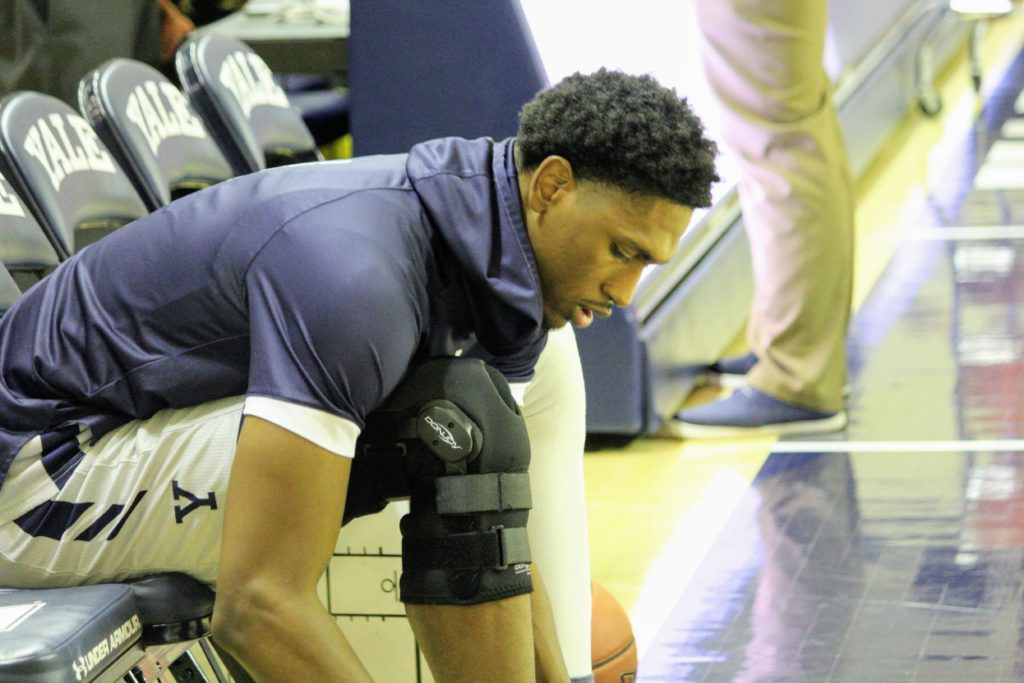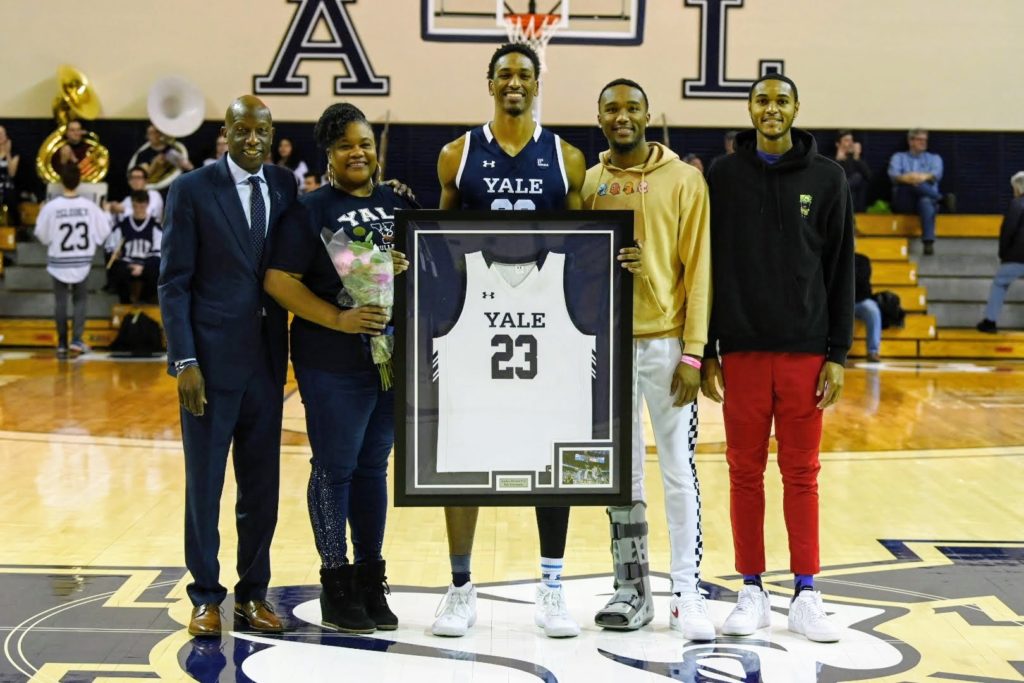MEN’S BASKETBALL: ‘An absolute no-brainer’ — Why Alabama is ‘ecstatic’ about signing Jordan Bruner ’20
Playmaking on the perimeter, a high basketball IQ, and a versatile presence around the rim. “We need exactly what he brings,” Alabama coach Nate Oats said.

Lukas Flippo
Alabama men’s basketball head coach Nate Oats had done his research.
Long before Yale forward Jordan Bruner ’20 saw his senior season come to a sudden halt and entered his name into the transfer portal, Oats said he and his coaching staff had looked through the list of Ivy League seniors graduating with a remaining season of eligibility. They knew Ancient Eight rules barred graduate students from playing in the conference, and Bruner stood out, becoming a Crimson Tide target before he even began to pursue opportunities as a grad transfer.
Oats said he watched a lot of game film on the 6-foot-9 Eli, and he loved what he saw. When the moment came — Bruner entered his name into the portal on the night of Wednesday, March 18 — the Alabama coach was the first to get a hold of him.
“I thought Bruner was the best available grad transfer on the market for what we needed immediate help with this year,” Oats said. “Different people rank guys differently. We need exactly what he brings … he was an absolute no-brainer, and we went after him.”
Other programs had the same idea, and Alabama was only the first of 25 schools to contact Bruner within his first three hours in the portal. A little more than 50 expressed interest as the process continued, Bruner told the News last month.

But Oats had the Yale forward’s game down cold, offering him a clear picture of his potential role in the lineup and the impact he could have on a program that gained three other key commitments while recruiting Bruner. Five-star guard Josh Primo, small forward Darius Miles and junior college guard Keon Ellis helped Alabama’s 2020 recruiting class scale the rankings before Bruner committed to the Crimson Tide last week.
“If you get down from 50 schools to three, then they have to be pretty good choices,” Bruner said after making his final decision. “I had good relationships with all the coaches, I felt good about all the systems and things, but I just prayed about it, and Alabama was the school I was led in the direction to go.”
On a teleconference call with reporters Thursday morning, Oats rattled off statistics about Bruner as if he had been a season ticket holder at the John J. Lee Amphitheater for Yale’s Ivy championship campaign.
A few sentences into his opening statement on the program’s five incoming recruits, he started on a tangent about the All-Ivy first team selection that lasted nearly two and a half minutes.
“I mean this is a kid that had a triple-double, I think only the third in Ivy League history and the only one in Yale basketball history,” the coach, who just finished his first year at the helm in Tuscaloosa, said. “He was two assists shy of another triple-double this year. He plays the way we need our bigs to play. And then on the defensive end of the floor, if you look at the analytics stuff … Yale was 18 points better when Jordan Bruner was on the floor per 100 possessions on the defensive end versus when he was off the floor.”
Oats said he lets his frontcourt play out on the perimeter, where Bruner has proven his status as a versatile threat. He averaged just over one three-pointer per game last season, ranking top-20 in three-point field goals per game in the Ancient Eight, and several of his assists came from beyond the arc. In total, he contributed 104 assists for the Elis last season, a mark that only trailed that of his classmate and point guard Eric Monroe ’20.
Alabama coaches envision Bruner, who also averaged a league-best 9.2 rebounds per game, helping to facilitate the offense.
“If you watched any film at Bruner, you just look at the stats, look at the assist numbers, he’s an elite-level passer for a big man,” Oats said. “The fact that he can blow by and make plays at the rim and pass the ball, you can’t just get up and crowd him … He can pass, he can finish, he’s athletic at the rim, so we’ll be able to play through him quite a bit.”
The defense cannot ignore his ability to shoot from deep, and the floor spacing that results combines with his strong court vision to complement a high basketball IQ. He makes the right play, outfitted with decision-making skills that shape possessions on the fly. At Yale, if underneath the basket, he could swing a pass to forward Paul Atkinson ’21 on the other block. If up near the perimeter, he could pop off a screen for an open three-pointer.
A night after Bruner tweaked his knee in a one-point loss to Harvard, the right play simply meant extra communication from the bench. The only one without a game jersey on, Bruner joined his cohort of fellow starters in a pregame huddle before returning to a seat on the bench, where his concentration remained on the game with Dartmouth. If he swapped his Yale basketball T-shirt for a dark suit, he might have been mistaken for Yale’s fifth assistant coach.
“He’s super vocal and he’s a great leader for us,” Monroe said that Saturday night. “He’s really good at taking guys to the side and breaking down plays for them and trying to help them understand what happened because he has a high basketball IQ and can help us that way.”
The day he named his final six — a list that included Alabama alongside Arkansas, Baylor, Gonzaga, Louisville and Maryland — Bruner said one of the criteria he used to guide the decision was distinguishing between who needed him and who wanted him. Oats painted a compelling case for the forward’s utility.
Bruner describes himself as straight to the point, and Oats gives off a similar candidness. With a strong recruiting class, he does not evade addressing the roster disruption Bruner and others could cause.
“The players see all the people we’re signing and they can do the math as well as we can,” Oats said. “I don’t know what all their roles are gonna be. I do know it’s going to be a lot harder for some guys that had a more significant role last year — they may not have that role. I mean, shoot, I’m honest with them.”
For Bruner, Alabama’s future facilitator, playing time is not a concern. His commitment culminated a two-week stretch that has Crimson Tide fans convinced of a resurgence.
Alabama ended the season ranked 60th in the nation — two spots behind Yale — in the 2020 Pomeroy College Basketball Ratings (KenPom). Meanwhile, four of Bruner’s other final six choices — Baylor, Gonzaga, Maryland and Louisville — all finished higher than 15th in the season’s final AP Top 25 Poll of the year. But in Bruner and his four fellow newcomers, Oats said he sees a path to renewed national relevance.
“We were super ecstatic when he ended up committing to us,” Oats said. “As soon as we can get ’em on campus and start meshing them with the returning guys we got, I think we’ll be onto something here.”
Bruner plans to wear number 11 for the Crimson Tide.
William McCormack | william.mccormack@yale.edu










